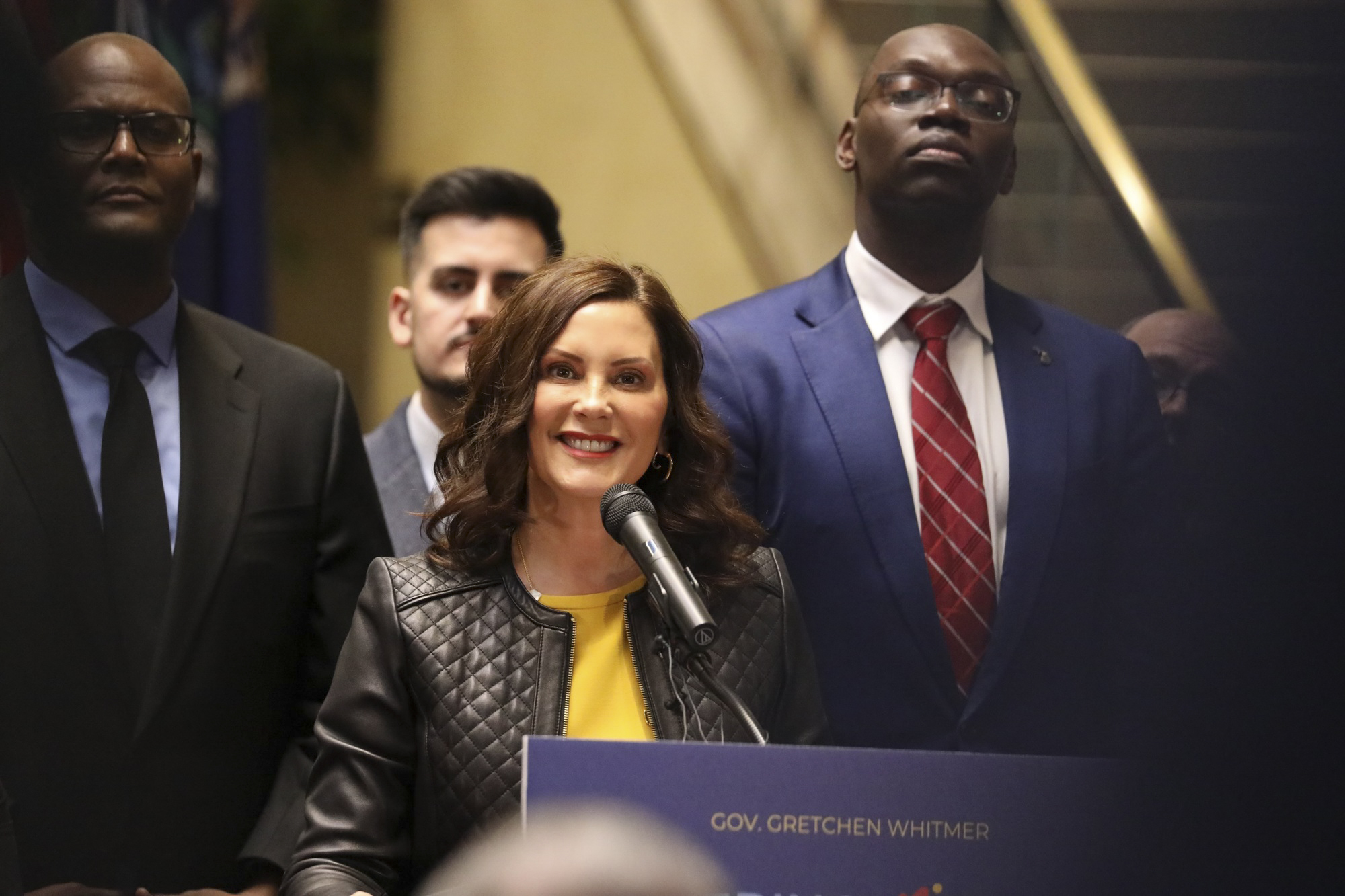DeVos-backed voucher scheme petitions withdrawn – plus more positive moves mark the start of this legislative session
By Brenda Ortega
MEA Voice Editor
Sen. Dayna Polehanki called it “our first victory for public education” resulting from the Democratic trifecta voters put in place with last November’s election — which is the first time in 40 years the party has controlled the state House, Senate and governor’s office.
 Shortly before the new Legislature was seated in January, petitions to enact a private schools voucher scheme in Michigan were withdrawn by the group — misleadingly labeled Let Mi Kids Learn — which had been funded and promoted in large part by Betsy DeVos and her family.
Shortly before the new Legislature was seated in January, petitions to enact a private schools voucher scheme in Michigan were withdrawn by the group — misleadingly labeled Let Mi Kids Learn — which had been funded and promoted in large part by Betsy DeVos and her family.
DeVos had hoped to circumvent the will of voters by spending millions of dollars to get the measure passed directly by the Legislature instead of going to the ballot. But the campaign missed a summer deadline for submitting petition signatures in time for the outgoing GOP-controlled House and Senate to act.
Finally in August the group turned in signatures, which had since awaited review by the state Board of Canvassers to potentially bring the measure before statewide voters in the 2024 General Election.
“Betsy DeVos chose to kill her own initiative rather than watch it lose at the ballot box,” said Polehanki, a former English teacher and MEA member who won re-election to a four-year term and is the new chair of the Senate Education Committee under the narrow majority now held by Democrats.
“Her initial plan was to bypass voters, using a GOP legislative majority to vote it into law,” Polehanki continued. “The Democratic trifecta prevented this from happening. A first big win for public schools!”
The withdrawal of petitions from consideration means the measure is effectively dead for now and will not go to either the Legislature or voters for passage.
If enacted, the voucher scheme would have drained $500 million from the state Education budget in the first year alone by allowing parents who send their children to private school to recoup their tuition costs in the form of tax credits.
The amount of money allowed to flow away from public schools toward private schools would have been allowed to increase by 20% each year, meaning after five years the amount lost to public education would have been $1 billion.
MEA was part of a broad-based coalition — called For MI Kids, For Our Schools — fighting back against DeVos’ plan, and MEA members engaged in part by sharing information to raise awareness about the proposal with family members, friends and colleagues, said MEA President Paula Herbart.
“We have proven yet again that the power of Michigan’s people can and will defeat Betsy DeVos’ checkbook,” Herbart said.
Recent research into similar voucher schemes enacted in other states has shown negative academic effects for children who used vouchers to move into private schools. Voters in Michigan previously defeated a DeVos-funded voucher initiative on the ballot in 2000 by a 39-point margin.
“Over the years — and especially last November — Michiganders have shown time and time again at the ballot box that they do not support efforts to defund public education,” said Casandra Ulbrich, spokesperson for For MI Kids, For Our Schools.
“Betsy DeVos and her allies never wanted the people of Michigan to vote on this, which is why they wanted to and subsequently failed to ram it through a favorable legislature last year. We will remain vigilant over the coming years, as DeVos and her anti-public education allies have shown that they’re willing to go above and beyond to destroy our neighborhood schools.”
More good news
Defeat of the DeVos voucher plan was quickly followed by other welcome news in the first week of the new legislative session. Two days later, Gov. Gretchen Whitmer and legislative leaders announced they would seek to repeal a retirement tax enacted in 2011 under former Gov. Rick Snyder.
The controversial move to tax retirees’ pensions, while at the same time cutting business taxes by $1.8 billion, has ever since served as a rallying cry for affected seniors. Eliminating the tax has been a Whitmer promise from the early days of her campaign four years ago.

MEA-Retired member Vivian Davis, a former school counselor in Adrian, attended the press conference where Whitmer and Democratic lawmakers announced the bills had been introduced — Senate Bill 1 by Sen. Kevin Hertel (D-St. Clair Shores) and House Bill 4001 by Rep. Angela Witwer (D-Delta Township).
Rolling back the retirement tax would save an estimated half million Michigan households $1,000 a year.
“I support Governor Whitmer’s proposal, vision, and ability to get things done to make Michigan a better place to live, and to relieve some of the financial pressures on those in their golden years,” Davis said of why she chose to attend.
MEA-Retired member Francis Cullen, a retired Traverse City teacher who also attended the press conference in support of the change, said he’s thrilled that a pro-educator majority has finally taken control in Lansing and called it “a revival of unionism in Michigan.”
“I am honored to be a part of today’s proceedings and know that with the quality people in leadership positions in our state, the lives of working men and women in Michigan will be greatly improved in the near future,” Cullen said.
Whitmer and other leaders at the press conference also announced plans to relieve financial pressures on working families by expanding the Earned Income Tax Credit, which was gutted in 2011 at the same time as the pension tax was enacted.
Boosting the earned income tax credit will deliver $3,000 annually to 700,000 low- and moderate-income Michigan homes, reaching fully half of Michigan’s children in an attempt to ease poverty in the 43% of working families that struggle to afford necessities such as food, housing and health care.
“Back in 2011, seniors and hardworking Michiganders saw the rug ripped out from under them,” Whitmer said at the press conference. “It was wrong then, and today we’re in a position to make it right.”
Afterward the new Senate majority leader, Sen. Winnie Brinks (D-Grand Rapids), tweeted similarly hopeful intentions for the near future:
“It’s an historic moment; we have 40 years of pent-up policy ideas, & we are ready to get to work. What our bills really boil down to is our desire to make MI a better place for young people, for seniors, for workers, for LGBTQ folks, really for everyone.”



